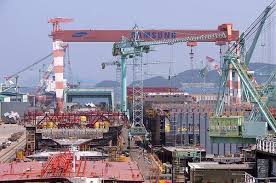
Samsung Heavy Industries (SHI), says it has invested over 400 million dollars in the Nigerian oil and gas industry since the global shipbuilding giant was awarded the contract to build the Floating Production Storage Offloading (FPSO) vessel for the 200,000 barrels of crude oil per day Egina deepwater field.
The contract for the construction of the FPSO was awarded to Samsung Heavy Industries by French multinational oil firm, Total at the cost of about 3.3billion dollars.
A top official of the company confirmed yesterday that through the SHI-MCI FZE, a fabrication and integration yard which SHI had established at the LADOL Free Zone Yard at Takwa Bay, Lagos to execute part of the FPSO project, it had ploughed back over 400 milion dollars into further development of the Nigerian petroleum industry.
“Since we got the contract for the Egina FPSO, we have contributed about 100 million dollars of tax revenue so far, in addition to providing approximately 300 million dollars of investment into SHI-MCI-FZE, and we have also created jobs, trainings and education for thousands of Nigerians,” added the source who wouldn’t want to be named.
The source however decried the lingering dispute between Samsung and Global Resource Management Free Zone Company (GRMFZC), LADOL’s free-zone management, which bothers on GRMFZC’s refusal to renew SHI-MCI-FZE’s Operating Licence for the free-zone, urging the Federal Government to wade into the crisis speedily.
“The government of Nigeria must take steps to resolve this crisis; it is not just hindering foreign direct investment into Nigeria, but it has far-reaching consequences for the Nigerian economy and its oil and gas industry.
“The FPSO has recently commenced capacity delivery, operating at 200,000-barrels a day,” the source explained.
Government’s intervention is indeed necessary to protect the jobs and livelihoods of over 1,000 Nigerians directly and indirectly employed by SHI-MCI-FZE, to protect the investments in the Nigerian Oil and Gas sector, which is the nation’s principle earner, and to send a message to Nigeria’s international partners that it remains an attractive place to invest and do business,” added the source.
It further stated that the SHI-MCI free-zone operating licence was unjustifiably terminated by LADOL and that there was no basis for the licence not to be renewable for a term of no less than one year once conditions of the licence are fulfilled.
It was however learnt that the Nigeria Export Processing Zone Authority (the primary agency responsible for the administration of free zone areas in Nigeria) and the Ministry of Industry, Trade and Investment, had recently stepped into the case to investigate and find ways to resolve whatever are the contentious issues affecting both parties.
The government intervention, it was learnt, is to help the parties achieve a win-win resolution to the crisis and also to protect the jobs of Nigerian workers.



